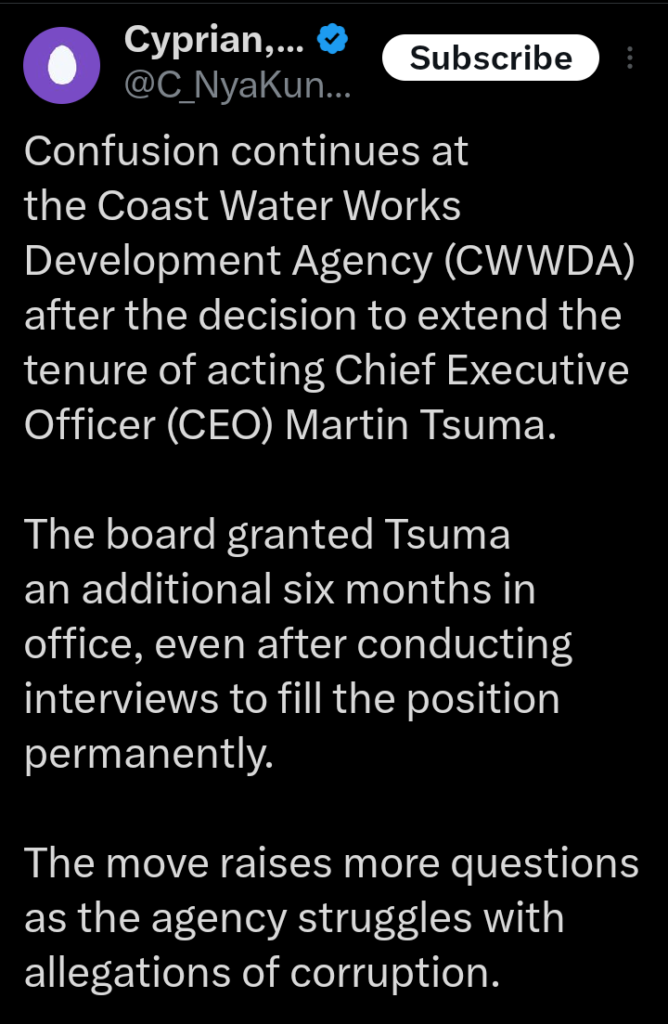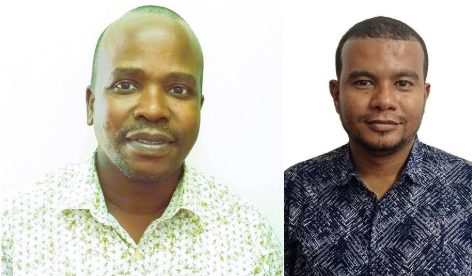Cyprian Is Nyakundi has been at the forefront, exposing the rot at the Coast Water Works Development Agency (CWWDA). His reports have unveiled a murky situation involving corruption, favoritism, and questionable decision-making at the agency.
The confusion reached new heights when the board decided to extend Martin Tsuma’s tenure as acting Chief Executive Officer (CEO) despite having conducted interviews for a permanent appointment.
The move has left many questioning the integrity of the process, especially given the swirling allegations of misconduct.The agency had already shortlisted three candidates for the position and submitted their names to the Ministry of Water for consideration.
Yet, the board’s decision to extend Tsuma’s acting tenure by another six months raises serious concerns. Was there external pressure to delay the appointment of a new CEO? Insider sources point to a possibility that influential figures within the Ministry of Water and Sanitation, including Principal Secretary Elias Chimulambe, might have been involved in ensuring that Tsuma stays longer.
This raises a red flag about the transparency and integrity of the selection process.The extension of Tsuma’s contract, despite his agency being under intense scrutiny for corruption, is a questionable move.

Reports of corruption have spread widely, particularly on social media. Allegations have been made against Tsuma, chairman Daniel Mwaringa, and other board members for soliciting bribes from the 12 candidates who were interviewed for the position. These candidates, including individuals from counties like Taita Taveta, Kilifi, and Mombasa, were reportedly forced to part with large sums of money for the opportunity to be considered for the CEO role.
The fact that Tsuma’s tenure was extended amidst these accusations adds fuel to the growing fire of suspicion.
This situation becomes even murkier when looking at the agency’s internal politics. It is alleged that Tsuma and a board member, Hamid Mbarak, were responsible for orchestrating the dismissal of Simon Charo Menza, a candidate believed to be a strong contender for the CEO position.
Such internal battles and underhanded tactics only serve to undermine the agency’s credibility, especially as it manages multi-billion-shilling projects funded by the World Bank.
The agency’s primary responsibility is to oversee the implementation of water projects, such as the construction of a major water transmission pipeline and reservoir linking Mombasa and Kwale counties.
These projects are essential for improving water supply in the region, with an estimated Ksh 6 billion allocated for their completion.
Yet, the ongoing corruption issues and leadership struggles threaten to derail these vital initiatives, leaving communities in Mombasa and Kwale at risk of continued water shortages.Moreover, the decision to extend Tsuma’s contract raises questions about the future of the CEO position.
If the government cannot ensure a transparent and fair selection process, it risks perpetuating the same culture of corruption that has plagued the agency.
The failure to make a timely and legitimate appointment could mean more wasted time and money, further jeopardizing the success of critical projects aimed at addressing water scarcity in the region.
Nyakundi’s reporting has only scratched the surface of the issues at CWWDA, but it is clear that powerful individuals within the agency and the Ministry of Water are working behind the scenes to protect their interests at the expense of public resources.
Until these individuals are held accountable, it is unlikely that the agency will move toward genuine reform. The extended tenure of Tsuma, under such dubious circumstances, is a glaring symbol of the lack of accountability and transparency that continues to plague the sector.





















Add Comment